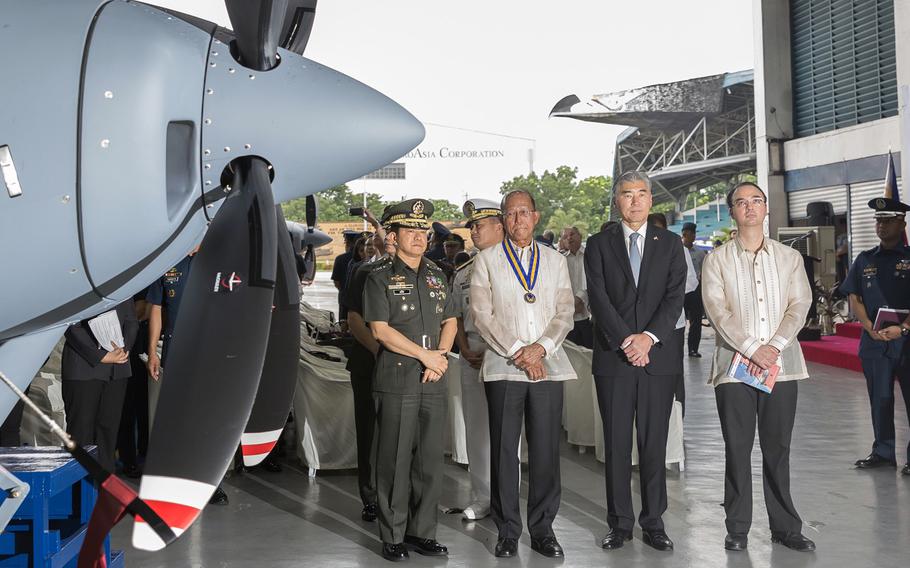
U.S. and Philippine officials gather at Villamor Air Base in Pasay City, Philippines, for a ceremony to transfer two new Cessna 208B surveillance planes to the Philippine Air Force, July 27, 2017. (Courtesy of U.S. Pacific Command)
The United States has delivered surveillance aircraft to the Philippines to aid the country’s ongoing battle against Islamic militants on the southern island of Mindanao.
The Philippine Air Force received two new Cessna 208B Grand Caravan intelligence, surveillance and reconnaissance planes during a ceremony Thursday at Villamor Air Base, Pasay City.
The aircraft were part of a $33 million defense package designed to boost the nation’s counterterrorism capabilities, U.S. Pacific Command said in a Friday statement.
“The U.S.-Philippine alliance is one of our most enduring, and the bilateral relationship has been a cornerstone of stability in the region for decades,” Lt. Gen. Bryan Fenton, PACOM deputy commander, said in the statement. “This C208 event is just one example of our partnership and shared commitment to stopping the spread of violent extremism in the region.”
The U.S. has provided the Philippines with equipment and training worth more than $179 million over the past decade, the statement said. That aid has included surveillance equipment, rubber raiding crafts, small arms, and aircraft and pilot training.
The Cessnas, which can deliver line-of-sight live data and air-to-ground information streaming, should be a boost to the Armed Forces of the Philippines.
Last May, more than 600 militants from various groups swearing allegiance to the Islamic State began an armed occupation of much of Marawi on Mindanao island, forcing Philippine forces into a monthslong campaign to retake the city.
U.S. Special Forces have been assisting by providing intelligence, reconnaissance and surveillance to AFP commanders on the ground directing the battle against the insurgents, the PACOM statement said.
Many analysts have said Islamic extremists are looking to shift operations to Southeast Asia after recent defeats in Syria and Iraq.
PACOM Commander Adm. Harry Harris said “multinational collaboration” would be needed to stop the spread of the “ISIS disease” in the Pacific region, during a visit last month to the Australian Strategic Policy Institute in Brisbane, Australia. Harris also said the extremists had declared Abu Sayyaf commander Isnilon Hapilon to be “emir” of Southeast Asia last year.
“In just a matter of months, Hapilon started uniting elements of several violent extremist organizations — building a coalition under the ISIS black flag,” Harris said. “These terrorists are using combat tactics that we’ve seen in the Middle East to kill in the city of Marawi in Mindanao — the first time ISIS-inspired forces have banded together to fight on this kind of scale in this region.”
The long-standing relationship between the U.S. military and the Philippines has continued despite the recent rocky relationship between the U.S. and Philippine President Rodrigo Duterte, who has insulted American leaders, curtailed joint military exercises and moved to improve his nation’s relationship with China.
Duterte told media outlets last month he was unaware that the U.S. military was assisting in Marawi and said he never asked the U.S. for help. A Duterte spokesman later said the president “accepted” he might need U.S. assistance to remove the militants.